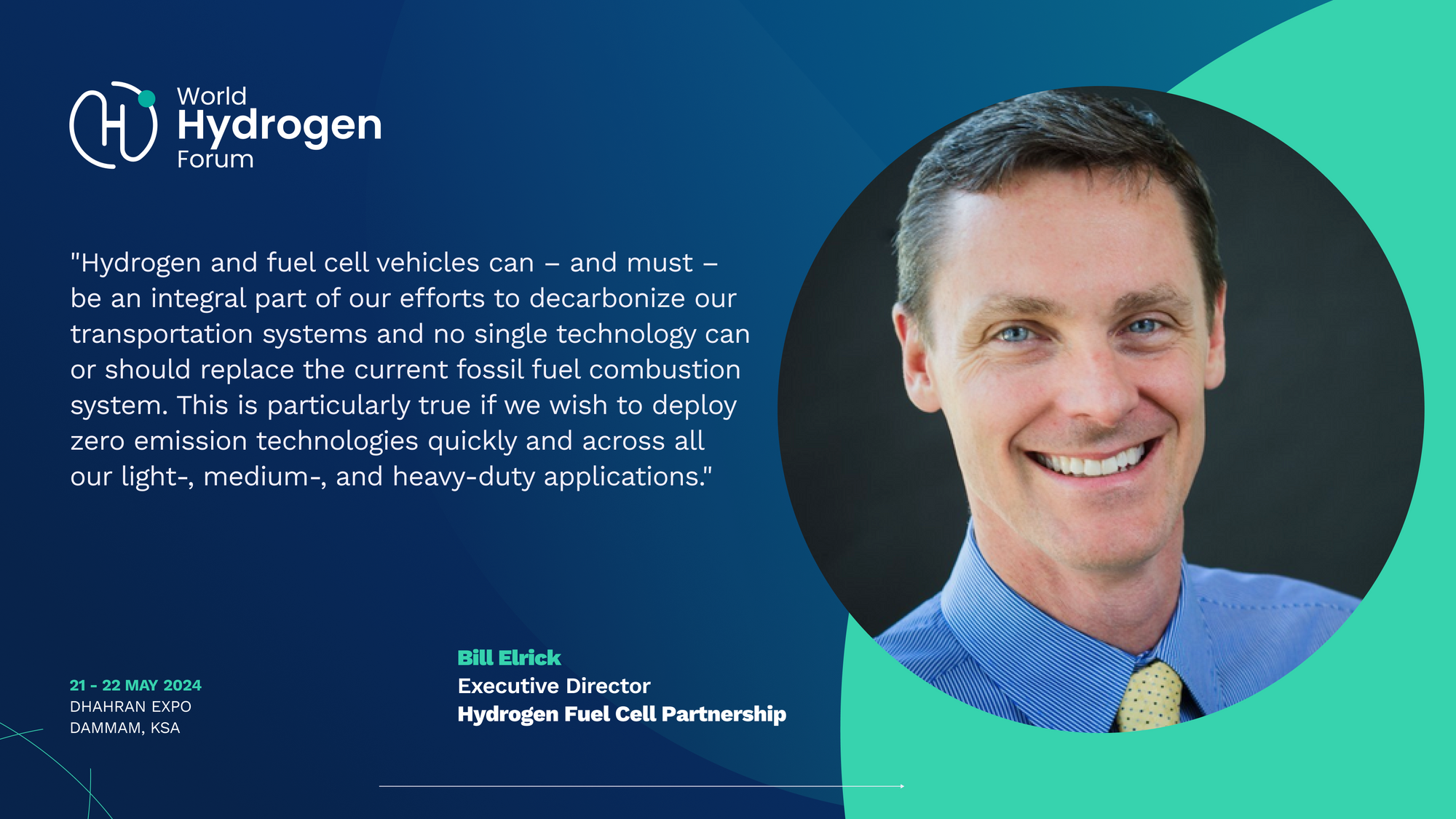With a distinguished career spanning over two decades, Bill Elrick stands at the forefront of addressing environmental and energy challenges within the transportation industry. As the Executive Director of the Hydrogen Fuel Cell Partnership, his work amalgamates private and public initiatives, striving relentlessly to integrate alternative fuels and advanced technology vehicles into mainstream transportation services. In this exclusive Q&A session, delve into key insights and perspectives shared by Bill Elrick as he navigates the landscape of sustainable transportation.
#WHF: From your experience in introducing hydrogen fuel cell vehicles in California, why do you believe these vehicles are important for global sustainability efforts?
#Bill Elrick: Hydrogen and fuel cell vehicles can – and must – be an integral part of our efforts to decarbonize our transportation systems and no single technology can or should replace the current fossil fuel combustion system. This is particularly true if we wish to deploy zero emission technologies quickly and across all our light-, medium-, and heavy-duty applications. These vehicles are complementary with battery vehicles and have the advantage of an infrastructure system that will be market driven as opposed to one thoroughly tied to the electric utility system. Hydrogen and fuel cell vehicles also provide opportunities to further diversify global clean energy production and spur new economic development.
#WHF: In deploying heavy-duty mobility solutions, could you illustrate how lessons learned from the light-duty market have been instrumental in overcoming challenges encountered in this transition?
#Bill Elrick: Having already launched the light-duty retail market in California and several other regions globally, we have already developed many of the foundational pieces and experienced valuable real-world lessons the heavy-duty sector will encounter. These include establishing and understanding basic safety, codes and standards, recognizing the importance of education and outreach (especially to end-users), permitting needs and requirements, and insights into establishing and scaling up the necessary hydrogen infrastructure network.
We also experienced how important it is for strong collaboration across public and private stakeholder groups, as well as across vehicle, infrastructure, and government sectors, and the need to build trust among them in the process. The light-duty market development brought hydrogen stations and infrastructure into a publicly accessible environment for the first time and are currently allowing us to work out early market challenges. All these experiences will positively translate to faster learning curves and adoption opportunities for heavy-duty markets.
#WHF: How crucial is government support, particularly through regulations, in promoting the hydrogen industry? Additionally, how essential is community education in encouraging growth within this sector?
#Bill Elrick: Positive government market signals and support are essential to kickstarting the difficult process of launching a new technology and market. By clearly outlining governments’ desired objectives and direction, such as public health and transportation decarbonization goals, the government sets the stage by which private industry can build a sustainable, clean transportation market. Government can send the proper market signals through a variety of support mechanisms (carrots) and regulations (sticks) to ensure clear guidelines towards those objectives and then empower industry to innovate, establish, and scale up the market to meet everyone’s needs.
It is critical that we are engaging the community as both the ultimate end-user of the technology (fleets and consumers) and as a societal effort to ensure these benefits are reaching everyone, especially those historically most impacted by the negative impacts of fossil fuel use. It is important we are engaging our communities throughout the progress to understand how best to deploy the technology and build the market to capture the greatest environmental and economic benefits possible across society.
#WHF: Could you discuss the synergy between hydrogen mobility and battery vehicle deployment in fostering a more renewable electric grid? How do these two technologies complement each other?
#Bill Elrick: Hydrogen and battery electric vehicles are complementary to each other, providing opportunities where the other is challenged (e.g. vehicle range, size, cost, fueling time). Neither is capable of singularly replacing traditional combustion vehicles, yet together they can. And just as hydrogen and batteries are complimentary vehicle technologies, so too are hydrogen and electricity complimentary energy carriers. Hydrogen can play an essential role in expanding renewable energy production and use; providing long duration storage, balancing the grid and improving its reliability, capturing previously curtailed renewable energy, providing new energy distribution opportunities, and enabling renewable energy to support particularly hard to decarbonize applications that cannot be readily electrified. Hydrogen can support more diverse, reliable, economical, equitable, and environmentally complete energy and transportation systems.
#WHF: In what ways do you believe the 'World Hydrogen Forum' event could significantly contribute to advancing the hydrogen industry?
#Bill Elrick: The World Hydrogen Forum provides an essential opportunity for various stakeholders to convene, connect, and collaborate around the development of hydrogen and fuel cell vehicle markets. The opportunity to come together in-person, share experiences and challenges, identify new business opportunities, and accelerate market development is crucial in these formative years of the hydrogen industry.

